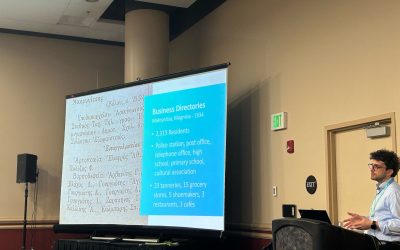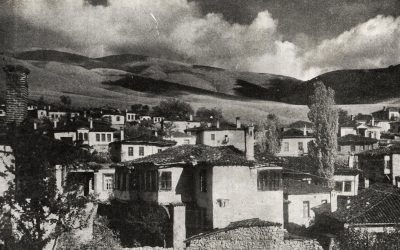By Sofia Pitsineli and Gregory Kontos
Discovering an archival treasure
The archives of the Greek Ministry of Foreign Affairs are preserved by the Diplomatic and Historical Archives Service, located in Athens. This archival organization is responsible for the storage, maintenance, cataloguing and utilization of written, audio-visual and electronic records, covering the central services of the Ministry, the diplomatic authorities abroad (embassies and consulates), the film archive and the Library of the Ministry of Foreign Affairs. Last February, Greek Ancestry’s team visited the Diplomatic and Historical Archives Service, in order to collect information on a particularly complicated topic: Greek children abducted during WWII.
The tale of “Dimitris”
In October 2020, Greek Ancestry had published the story of “Dimitris”, a Greek child from Macedonia, who was abducted by the Bulgarian forces in 1943. “Dimitris” was the child’s supposed birth name, as he was taken away from his family as a toddler and did not recall his birth name with certainty. Because of his young age, he was never quite able to recall the circumstances or details of his departure from Greece and arrival in Bulgaria. However, what is known is that in 1944 he was brought to the town on Valchedram, presently in the Montana Province of Bulgaria. Around 1946, “Dimitris” along with 2 other children found themselves being sold to a Romani family in Lom, Bulgaria, where they lived in conditions of utmost poverty and cruelty.
After a violent incident, in 1949, “Dimitris” managed to escape. To recover from all the physical abuse he had received, he was subsequently brought to a hospital. However, luck betrayed him once again. While he was still a patient at this hospital, the Greek Embassy in Sofia was retrieving the group of children who had been taken away about 6 years earlier. The Embassy returned the children to their families, but “Dimitris”, still recovering from his afflictions, was not located by the Embassy and never returned to Greece. Thus, he spent the rest of his childhood years as an orphan – never knowing the truth of his identity. Indeed, it wasn’t until the late 1960s, when the Bulgarian police approached him, that “Dimitris” even knew he was of Greek origin.
For the remainder of his life, “Dimitris” searched for clues about where his family was in Greece and why he had been so mysteriously taken away at such a young age. However, he was never met with much success, and unfortunately, he passed away in February 1978, when he was about 38 years old.



Dealing with abductions – Repatriating children
Due to the scarce information available about “Dimitris”, our team has not yet been able to locate documentation about his case. Nevertheless, our visit to the Archives was quite illuminating regarding the history of the abductions and repatriations of Greek children during that time period. The corresponding archival folders include long lists of abducted Christian and Muslim children, their stories, as well as documents highlighting the procedures that their parents followed, in order to locate and bring them back. However, repatriation raised practical challenges. Some parents had moved during the war either within Greece or abroad, while in other cases there was no parent left to claim the children. These orphans relied solely on the interest of the Greek state to take them back. But the state was not always interested in their repatriation. Apparently, this was a very complicated matter, as it involved post-WWII politics at the dawn of the Cold War. Abducted and taken to the countries of the Eastern Bloc, it was believed that those approximately 28,000 children, according to a source, were receiving communist education. Therefore, their return to the homeland was sometimes seen as a potential threat to the democratic establishment of that time.

The tale of Aspasia
While the exact number of the children who were kidnapped during the war is unknown, this phenomenon must have shocked contemporary society and was one of the most brutal aspects of the war. The story of Dimitri perfectly indicates the tragedy. Nonetheless, ironically, in a few cases, abduction could prove to be liberating, as some children either ended up in better conditions than those at home or were saved by the cruelty of what was going to unfold into a civil war in Greece. In one of the folders that we studied during our visit to the Archives, we discovered such a story, the story of Aspasia.
Aspasia was born in a village of Macedonia in 1938. Around 1944 she and her family were attacked and tortured by a Greek anti-communist paramilitary group, in order to betray information about communist activity in their area. A few months later, the family suffered a second attack, this time by the Bulgarian army. Aspasia was kidnapped and taken to Bulgaria. There, she started a new life and, according to a report found in the diplomatic documents, she began to dream again. In Bulgaria, Aspasia was provided with education, allowed to go to school, and was taken care of. Did she make a family in Bulgaria? Did she ever return to Greece to see her family and homeland again? The available sources do not have answers to all our questions. Maybe Aspasia or her descendants are among the readers of this article. Maybe not. What is certain is that this archival material gives hope to anyone trying to discover more about family members and ancestors who were abducted during the dark times of the Second World War.
Did you like this “Yiayia & Me” article? Help us with the next one!
Share your story or consider making a donation by clicking here, and make your yiayia proud!



